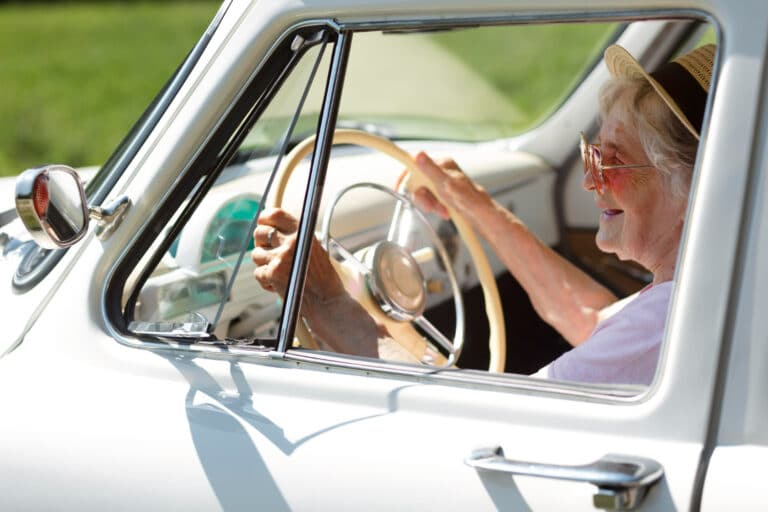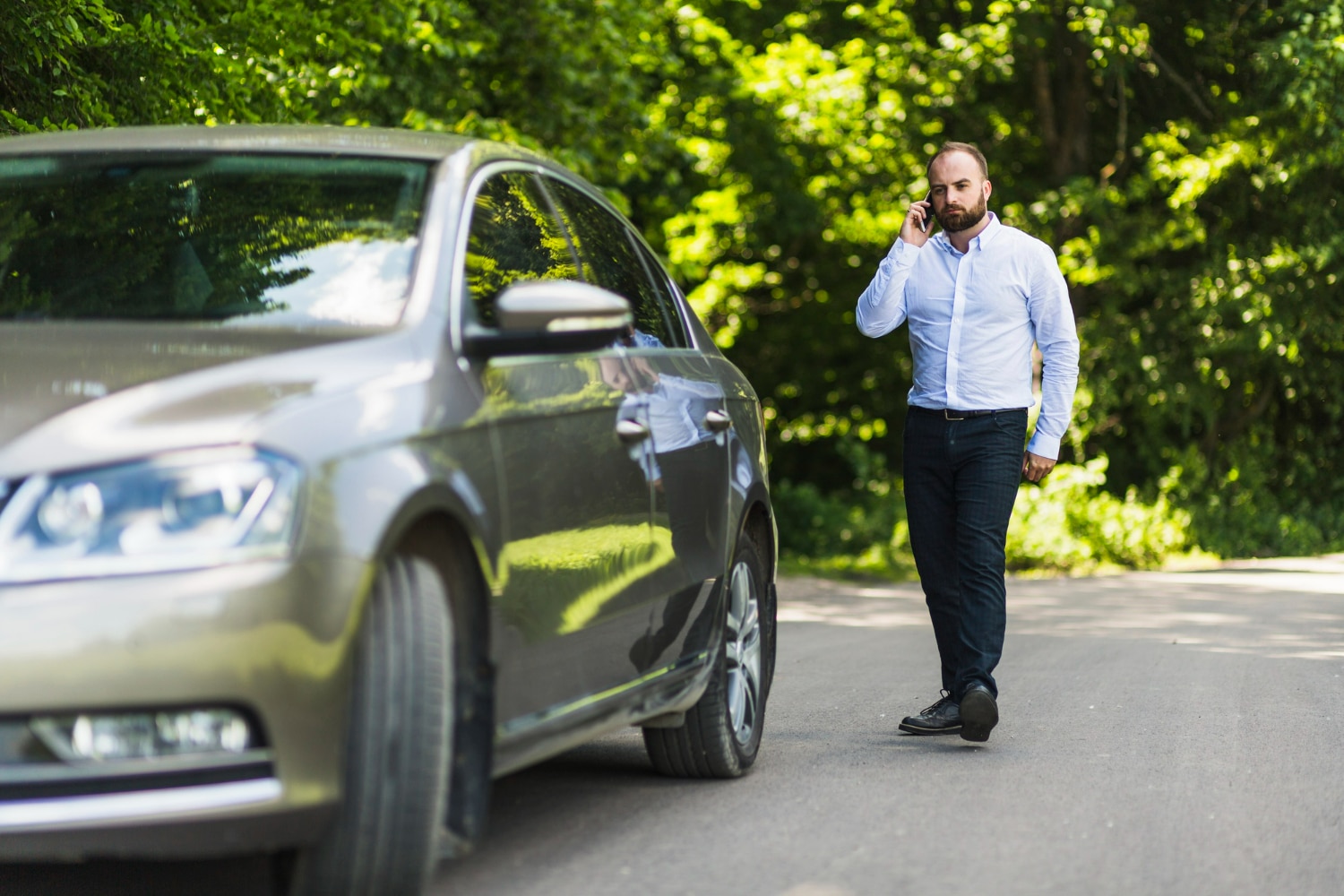California has specific laws in place for senior citizens who want to continue driving. These regulations are designed to ensure both the safety of the seniors and those they share the road with.
Aging can bring changes to vision, reaction time, and physical strength, making it important for the state to enforce certain requirements that allow seniors to maintain their driving privileges safely.
Understanding these laws can help senior drivers make informed decisions about staying on the road and avoiding potential accidents or penalties.
Senior Citizen Car Crash Stats
| Statistic | Data |
|---|---|
| Percentage of Drivers Aged 65+ | 18% |
| Seniors Killed in Car Accidents (2020) | 7,700 |
| Seniors Treated for Crash-Related Injuries (2020) | 200,000+ |
| Crash Rate for Drivers Aged 70-79 | Higher than middle-aged drivers |
| Percentage of Crashes in Daytime | 66% |
| Percentage of Crashes on Weekdays | 72% |
An Overview of Senior Driving in California
Driving is often seen as a symbol of independence for many senior citizens, but as we age, it can become more difficult to meet the physical and mental demands of driving.
California’s laws are aimed at balancing the freedom of driving with the need to ensure road safety.
The Importance of Safe Driving for Seniors
As people age, natural physical and mental changes can affect their ability to drive.
Vision can decline, reflexes can slow down, and medications may affect alertness. These changes make it crucial for senior drivers to stay mindful of their own abilities and limitations.
California’s driving laws for seniors are intended to ensure that older drivers remain safe on the road—both for themselves and for others.
For instance, seniors over the age of 70 are required to renew their license in person, which allows the DMV to assess their driving fitness more thoroughly.
California DMV’s Approach to Senior Drivers
The California Department of Motor Vehicles (DMV) plays an active role in evaluating senior drivers.
Rather than focusing solely on age, the DMV looks at individual health, medical conditions, and driving records.
This process helps seniors retain their ability to drive while ensuring that their health doesn’t jeopardize road safety.
The DMV uses vision and written tests to evaluate seniors, and in some cases, requires a behind-the-wheel driving test to ensure they can still manage the physical and mental demands of driving.
These evaluations are meant to keep roads safe without unfairly restricting senior drivers’ independence.
Legal Framework for Senior Driving
California’s driving laws for seniors are primarily governed by the California Vehicle Code.
The state mandates that drivers aged 70 and older renew their licenses in person every five years.
During this renewal process, seniors must undergo a vision test, and depending on their health or driving history, they may also be required to take a written exam or road test.
These laws are designed to prevent age-based discrimination while addressing potential safety risks posed by medical conditions or other age-related changes.
It’s important for senior drivers to be aware of these laws, as they ensure a fair assessment of their driving ability rather than an automatic restriction based on age.
Driver’s License Renewal Requirements for Seniors
In California, seniors aged 70 and older must follow specific rules when renewing their driver’s licenses. These regulations help ensure that older drivers remain safe on the road while addressing age-related changes. Below are the key requirements for senior license renewals:
- In-Person Renewal – Seniors must renew at the DMV every five years.
- Vision Test – Seniors must pass a vision test or provide a doctor’s report.
- Written Test – Some seniors may need to take a written knowledge test.
- Driving Test – A behind-the-wheel test may be required based on health or driving record concerns.
- Medical Report – Seniors with health conditions affecting driving may need a doctor’s report.
- Extensions – Temporary extensions may be granted due to illness or personal circumstances.
- License Restrictions – Restrictions like no freeway or nighttime driving may apply based on health.
- COVID-19 Adjustments – Temporary online renewals were allowed during the pandemic.
- Mobility Accommodations – DMV provides accommodations for seniors with mobility issues.
Understanding these renewal requirements helps seniors maintain their driving privileges while ensuring road safety.
Driving Restrictions for Senior Citizens
California driving laws for seniors also include specific restrictions designed to enhance safety on the road.
These restrictions are typically applied to seniors who may have physical or cognitive impairments but can still drive under limited conditions.
By tailoring driving privileges to the abilities of individual seniors, the California Department of Motor Vehicles (DMV) aims to ensure both driver safety and the safety of others on the road.
Common License Restrictions for Seniors
As seniors age, certain physical or cognitive changes can affect their driving abilities.
To ensure safety, the California DMV may place restrictions on a senior’s driver’s license based on their medical conditions or performance during required tests.
These restrictions are designed to allow seniors to continue driving while addressing any limitations that could make certain driving situations more dangerous.
Here are the most common license restrictions for senior drivers:
- No Freeway Driving – Seniors may be restricted from driving on freeways, where higher speeds and quick decision-making are required.
- Daylight-Only Driving – Some seniors may only be allowed to drive during daylight hours due to vision problems or other health issues that make night driving difficult.
- Additional Mirrors – Seniors may be required to install an extra right-side mirror for increased visibility.
- Time of Day Restrictions – In some cases, seniors may be limited to driving during specific times of day when traffic is lighter.
- Geographical Limits – The DMV may restrict seniors to driving only within certain areas, such as close to their home.
- Speed Restrictions – Some seniors may be limited to driving at lower speeds to ensure they remain in control.
- Medical Device Requirements – If necessary, seniors may need to use a medical device while driving, such as hand controls for steering.
- No Night Driving – Due to vision or reflex issues, seniors may be prohibited from driving after dark.
These restrictions help seniors continue to drive safely while considering any health or physical changes that might affect their ability to drive.
Medical Conditions Leading to Restrictions
Certain medical conditions commonly associated with aging can lead to driving restrictions for seniors.
Conditions like arthritis, which can limit mobility, or Alzheimer’s disease, which affects cognitive functions, may prompt the DMV to issue a restricted license.
For example, a senior with arthritis might struggle to turn their head quickly to check blind spots, leading to restrictions on where and when they can drive.
Additionally, the DMV may review a senior’s medical history to determine whether other conditions, such as heart disease or seizures, could impact their ability to drive safely.
Appeal Process for Restricted Licenses
If a senior driver receives a restricted license and feels it is unwarranted, there is an appeal process in place.
The senior has the right to request a hearing with the DMV to challenge the restrictions.
During this process, they can present medical evidence or other documentation that supports their ability to drive safely without the need for restrictions.
It’s important for senior drivers to know they can appeal these decisions if they believe the restrictions are too limiting or unnecessary.
Medical and Vision Testing for Senior Drivers
In California, medical and vision testing play a critical role in determining whether senior drivers can safely continue to operate a vehicle.
These tests are not meant to discriminate against older drivers but to ensure that they are capable of meeting the physical and mental demands of driving.
Mandatory Vision Tests
Vision is one of the most important senses when it comes to driving, and California law requires all drivers over the age of 70 to undergo vision testing during license renewal.
The DMV uses this test to ensure that senior drivers can see clearly enough to read road signs, recognize hazards, and respond to changes in the driving environment.
The minimum requirement for passing the DMV’s vision test is 20/40 vision in at least one eye, with or without corrective lenses.
If a senior driver fails the vision test, they may be required to provide a report from an eye care specialist or face restrictions on their license, such as daylight-only driving.
Medical Conditions and Their Impact on Driving
Certain medical conditions common among seniors can have a significant impact on driving ability.
Conditions like Alzheimer’s, dementia, or Parkinson’s disease can impair judgment, memory, and motor skills, making it unsafe to drive.
In addition, medical issues such as heart disease, seizures, or diabetes can also lead to restrictions or even the loss of driving privileges.
The DMV may require senior drivers with such conditions to submit regular medical evaluations or take additional driving tests to determine if they are still fit to drive.
If a doctor determines that a senior’s condition makes driving too dangerous, the DMV can revoke their license or place restrictions on it.
Reporting Medical Conditions to the DMV
Doctors in California are required by law to report certain medical conditions that might affect a person’s ability to drive safely.
If a doctor believes a senior driver is no longer fit to be on the road due to a medical condition, they must inform the DMV.
In turn, the DMV will review the driver’s record and decide whether a license should be suspended, revoked, or restricted. The DMV may also require the senior to provide a medical report at regular intervals to monitor their condition over time.
This process ensures that senior drivers are held to the same safety standards as all other drivers, with particular attention to how aging-related health issues may impact their abilities on the road.
Protect Your Driving Rights with Crockett Law Group
If you or a loved one are dealing with driving restrictions or need legal assistance after a car accident, Crockett Law Group is here to help.
As a trusted Santa Ana car accident attorney, we can guide you through the legal process and ensure your rights are protected.
Call us today at (800) 900-9393 for a consultation!











